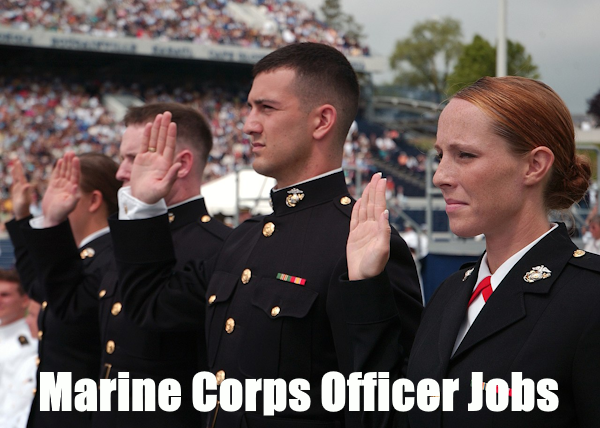Marine officer jobs are in huge demand.
There are many individuals who dream of becoming a Marine officer.
However, the process is grueling and time-consuming.
For this reason, it helps to know the different options and military specialties (MOS) available.
Learn more about Marine officer jobs, including the application process and training programs, below.
Related Article – Marine Corps MOS List + ASVAB Scores: Details On All 125 Jobs
Table of Contents
Marine Corps Officer Jobs
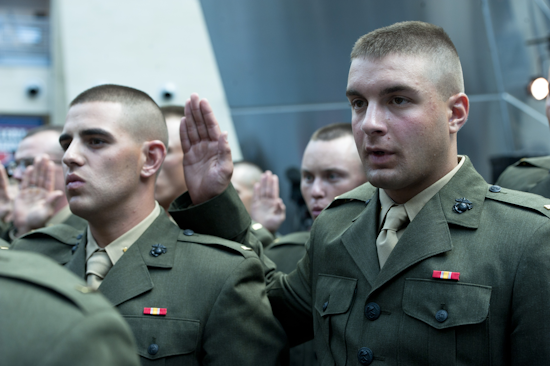
Marine officer jobs provide a tremendous opportunity for advancement.
The various programs are designed for both enlisted personnel as well as civilians seeking to join the Marine Corps.
As a result, there are numerous avenues to pursue for those interested in a career in the military.
Marine officers serve at the forefront of the nation and handle many critical responsibilities.
As such, Marine officers are generally very experienced and well-trained, often skilled in a technical specialty or expertise.
Marines are leaders who defy the opposition with vigor and resilience.
Consequently, the service branch develops Marine officers in a variety of ways.
These include the following Marine Corps officer training programs:
- Marine Corps Platoon Leader Course
- Marine Officer Candidate School (OCS)
- United States Naval Academy
- NROTC Marine Officer Program
- Marine Enlisted Commissioning Program (ECP)
The steps to becoming a Marine officer begin with the recommendation of an Officer Selection Officer (OSO) for enlisted personnel.
Meanwhile, civilians with a college education (or currently attending an accredited college or university) are also eligible for consideration.
Then, after graduation, the specific training and Marine officer program depends on several factors, including:
- College Education
- Requirements & Qualifications
- Military Occupational Speciality (MOS) Preferences
Marine officer jobs in the military are competitive and require the best in personal fitness and character (more details, below).
Therefore, not everyone will have the willingness, determination, judgment, and leadership to become a Marine officer.
Discover more information about the most common pathways for becoming a Marine officer, below:
Marine Corps Platoon Leaders Class
The Marine Corps Platoon Leaders Class (PLC) is one of the more common pathways toward becoming a Marine officer.
The class is designed to provide a commissioning program for undergraduate college students.
For this reason, students must currently be enrolled full-time in an accredited college or university.
In general, candidates for the program attend college while also becoming enlisted personnel.
Therefore, service members have the opportunity to earn military pay and benefits while attending school.
There are 2 different training options for Marine PLC:
- Two 6-week summer training sessions
- Single 10-week training session
The first option is open to college freshmen and sophomores.
Meanwhile, the second option is only available to college juniors.
Please keep in mind that no option exists for college seniors, so you’ll need to plan ahead.
Nevertheless, all military training takes place in Quantico, Virginia, the same location as Marine OCS training.
Platoon Leaders Class is a rewarding opportunity to develop leadership and technical skills, as well as earn a higher salary in the military.
Marine Officer Candidate School (OCS)
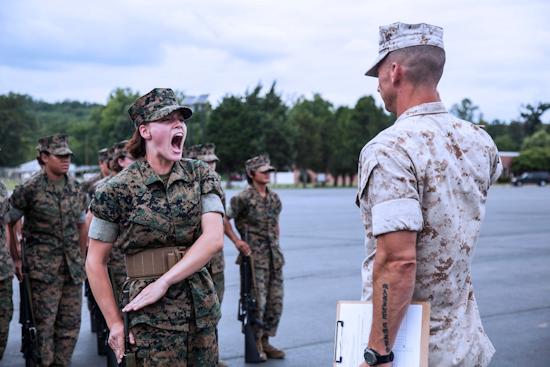
Marine Officer Candidate School (OCS) is arguably the most common way to achieve a commission within the service branch.
The Officer Candidate Course lasts 10 weeks and pushes recruits to the limits.
The training program is designed for college seniors and graduates, unlike the Platoon Leaders Course (PLC).
Students are evaluated based on 3 categories of performance (academics, leadership, and physical fitness).
The training program consists of several different phases, each with its own unique set of challenges.
Then, upon graduation, candidates become newly commissioned officers in the U.S. Marine Corps.
The commissioning process is when the Marine takes an oath and officially earns the ranking of a military officer.
Accordingly, commissioned officers receive a higher monthly salary and other benefits.
Next, officers progress to The Basic School (TBS) where they begin active duty status with the rank of Second Lieutenants (O-1).
The Basic School (TBS)
The Basic School is the next step in the training process after Marines receive their commission from OCS.
Marine OCS is notorious for its demanding, rigorous physical training.
Whereas, The Basic School is more designed to produce the management and leadership skills necessary to become an officer.
As such, newly commissioned officers complete 6 months of training at Marine TBS.
The type of training and classroom setting (field exercises, exams, etc.) varies depending on the military specialty.
Nonetheless, candidates can expect to face a variety of challenges and tests.
Thus, Marine TBS is a fantastic training location for developing effective skills needed to command a unit or battalion.
United States Naval Academy
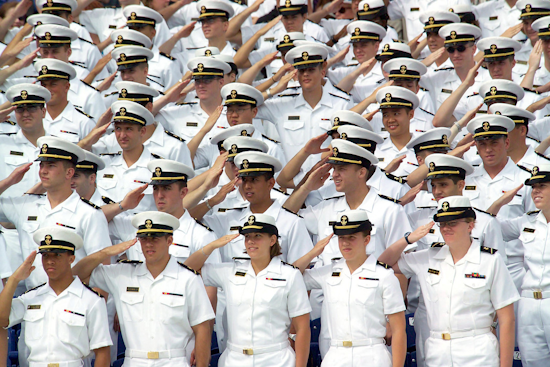
The U.S. Naval Academy is generally associated with the Navy, not the Marine Corps.
However, many forget that the Marine Corps operates under the command of the U.S. Navy and therefore has much integration.
The Naval Academy is one such example, as it develops officers for both the U.S. Navy and the Marine Corps.
The academy has an incredible history that dates back to the 19th century and is the second-oldest military institution in the country.
Navy midshipmen learn their studies and train under supervision at “The Yard” — the nickname for the 338-acre campus.
The gorgeous campus rests in Annapolis, MD, along the confluence of the Severn River and Chesapeake Bay.
Midshipmen spend 4 years studying at the academy before graduating with a commission in the Marine Corps or Navy.
Then, there is a service obligation (just like the other Marine officer training programs).
Selection to the U.S. Naval Academy is infamously competitive and requires a separate nomination, usually from a member of Congress.
High school students preparing for the Naval Academy may want to consider attending the Navy Preparatory School.
NROTC Marine Officer Program
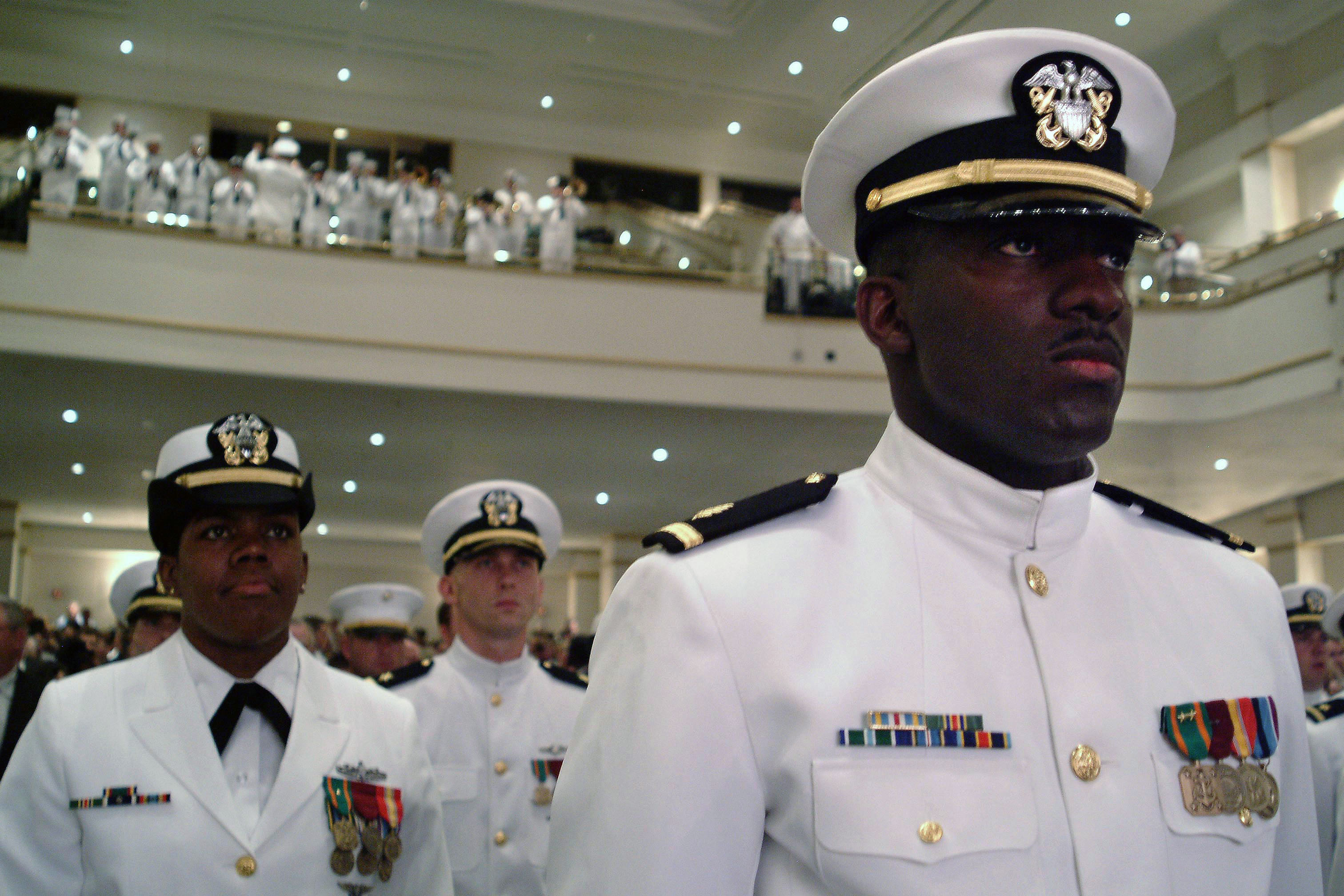
Marine NROTC is another pathway toward becoming an officer in the service branch.
The NROTC Marine option is another avenue for people who want to attend college while also receiving comparable military training.
As such, the Naval Reserve Officer Training Corps (NROTC) has a specific option for those who seek to become Marine officers.
For this reason, Navy NROTC offers another means to a commission in the United States Marine Corps.
The Naval Reserve Officer Training Corps offers scholarships for eligible students.
In general, officer candidates must meet the following requirements:
- U.S. citizen
- Ages 17 – 27
- High school diploma (or GED equivalent)
- Physically qualified to serve in the Marine Corps
There is an age waiver granted in limited circumstances for those older than 27.
More importantly, the Marine Corps is seeking candidates of high character with no record of military or civil offenses.
Marine Officer Program Scholarships
Do you need help paying for a college education?
If so, the Marine Corps may be worth considering.
The service branch offers many different scholarships for those interested in an officer program.
These scholarships include:
- NROTC Scholarship
- Frederick C. Branch Leadership Scholarship
- Pedro Del Valle Leadership Scholarship
- Margaret Brewer Leadership Scholarship
- Vincente Tomas Garrido Blaz Leadership Scholarship
- Lt Gen Frank E. Petersen Scholarship
- Military Youth Organization Scholarship
Interested? Learn more about how to apply for various scholarships.
Marine Enlisted Commissioning Program (ECP)
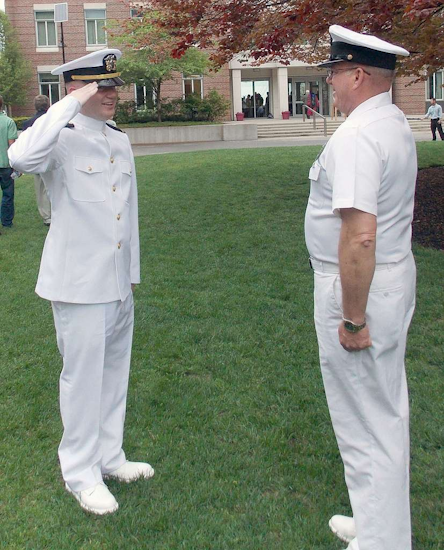
The Marine Enlisted Commissioning Program (ECP) can also help pave the way to becoming a commissioned military officer.
The program offers an enlisted Marine the opportunity to attend a 4-year college or university.
Ultimately, the goal of the program is to earn a college degree and transition into a Marine officer.
Thus, the service branch provides financial support in exchange for a service commitment following graduation.
The Marine Enlisted Commissioning Program is open to service members who have at least 1 year of active duty experience.
Additionally, Marines must have at least 12 months remaining on their service obligation.
Graduates of Marine ECP progress to the same Basic School (TBS) as other newly commissioned officers.
Next, Marine officers are divided depending on military occupation and receive specialized training thereafter.
The Marine Corps does have the discretion of assigning officers based on need.
Marine Corps Officer Jobs (Complete List)
The Marine Corps officer training programs are divided into 3 sections:
- Marine Officer Appointments
- Officer Naval / Enlisted Programs
- Marine Corps Operations
Marines are trained in many different roles yet share a common goal and mentality.
Currently, there are hundreds of Military Occupational Specialities (MOS) available for Marines.
However, placement may depend on the needs of the service branch rather than individual requests.
Nonetheless, each year is different and features separate demands or requirements.
Marine Infantry Officers
United States Marine Infantry Officers are responsible for preparing and leading ground combat missions.
These include military occupational specialties (MOS) such as:
- Manpower Officer (0102)
- Light Armored Reconnaissance (LAR) Officer (0303)
- Expeditionary Ground Reconnaissance (EGR) Officer (0307)
- Field Artillery Officer (0802)
- Combat Engineer Officer (1302)
- Marine Cyberspace Warfare Officer (1702)
- Assault Amphibious Vehicle Officer (1803)
Marine Intelligence Officers
Marine Corps intelligence is responsible for the collection, processing, and dissemination of intelligence.
The military specialties include intelligence analysis, counterintelligence, and imagery / geographic intelligence.
The most common Marine officer roles in the career field:
- Communications Officer (0602)
- Ground Intelligence Officer (0203)
- Counterintelligence and Human Source Intelligence Officer (0204)
- Signals Intelligence and Electronic Warfare Officer (0206)
- Marine Corps Air Intelligence Officer (0207)
Marine Corps Logistics Officers
Marine Logistics Officers are critical thinkers and planners.
For this reason, they excel in coordinating and leading individuals in a variety of settings.
Marine Logistics Officer (0402) is the most common designation under this career path.
The other military careers include:
- Communications Officer (0602)
- Ground Supply Officer (3002)
- Financial Management Officer (3404)
Marine Specialty Officers
Marines also specialize in certain trades or occupations.
These include Marine lawyers and police officers, who each have an important responsibility within the service branch:
- Judge Advocate (4402)
- Communication Strategy and Operations Officer (4502)
- Military Police Officer (5803)
Marine Corps Aviation Officers
The Marine Corps also helps train aspiring pilots and aviation mechanics.
Accordingly, the following officer programs are available:
- Aviation Maintenance Officer (6002)
- Aviation Supply Officer (6602)
- Aviation Command and Control Officer (7202)
- Air Support Control Officer (7208)
- Naval Flight Officer (7578)
Marine Officer Program Requirements
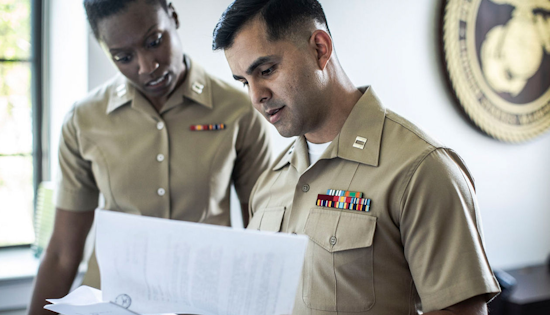
In general, candidates for Marine officer training programs need to exhibit a few basic requirements.
These include the following expectations:
- Citizen of the United States
- Between the ages of 18 – 27
- Must pass a physical examination
- Bachelor’s degree (or currently attending college full-time)
- Must attend and complete Officer Candidate School (OCS)
Otherwise, the requirements vary depending on the military occupational specialty (MOS).
Additionally, the Marine Corps demands that candidates display:
- Pride of Belonging
- Pride of Purpose
- Your Place in a Common Cause
The Marine Corps is a very proud and historic service branch that demands the very best character and physical fitness from officers.
Thus, the journey is not made overnight but with great time and effort.
Conclusion
Marine officer jobs are abundant for those willing to put in the time and work.
These programs range from traditional college experiences to training specifically designed for military life.
As such, officer candidates acquire the necessary education and job skills to succeed in the military.
Marine officer training programs range from Officer Candidate School (OCS) to the Enlisted Commissioning Program (ECP).
Featured Image Source – www.Wikimedia.org
- Ikon Pass Military Discount: Learn How To Save Big - January 31, 2025
- RTIC Military Discount: Find Out How To Save Big on Gear - January 30, 2025
- Traeger Military Discount: Learn How To Save Big on Smokers - January 28, 2025

